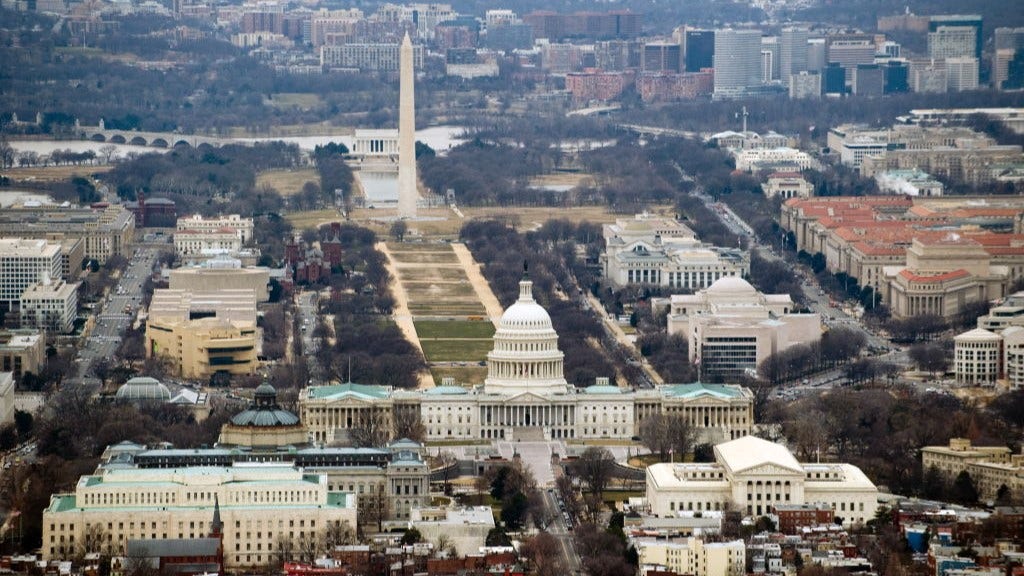North Dakota
Beloved Wild Horses Roaming North Dakota National Park May Be Removed

BISMARCK, N.D. (AP) — The beloved wild horses that roam freely in North Dakota’s Theodore Roosevelt National Park could be removed under a National Park Service proposal that worries advocates who say the horses are a cultural link to the past.
Visitors who drive the scenic park road can often see bands of horses, a symbol of the West and sight that delights tourists. Advocates want to see the horses continue to roam the Badlands, and disagree with park officials who have branded the horses as “livestock.”
The Park Service is revising its livestock plans and writing an environmental assessment to examine the impacts of taking no new action — or to remove the horses altogether.
Removal would entail capturing horses and giving some of them first to tribes, and later auctioning the animals or giving them to other entities. Another approach would include techniques to prevent future reproduction and would allow those horses to live out the rest of their lives in the park.
The horses have allies in government leaders and advocacy groups. One advocate says the horses’ popularity won’t stop park officials from removing them from the landscape of North Dakota’s top tourist attraction.
“At the end of the day, that’s our national park paid for by our tax dollars, and those are our horses. We have a right to say what happens in our park and to the animals that live there,” Chasing Horses Wild Horse Advocates President Chris Kman told The Associated Press.
Last year, Park Superintendent Angie Richman told The Bismarck Tribune that the park has no law or requirement for the horses to be in the park. Regardless of what decision is ultimately made, the park will have to reduce its roughly 200 horses to 35-60 animals under a 1978 environmental assessment’s population objective, she previously said.
Kman said she would like the park “to use science” to “properly manage the horses,” including a minimum of 150-200 reproductive horses for genetic viability. Impacts of the park’s use of a contraceptive on mares are unclear, she added.

Ousting the horse population “would have a detrimental impact on the park as an ecosystem,” Kman said. The horses are a historical fixture, while the park reintroduced bison and elk, she said.
A couple bands of wild horses were accidentally fenced into the park after it was established in 1947, said Castle McLaughlin, who in the 1980s researched the history and origins of the horses while working as a graduate student for the Park Service in North Dakota.
Park officials in the early years sought to eradicate the horses, shooting them on sight and hiring local cowboys to round them up and remove them, she said. The park even sold horses to a local zoo at one point to be food for large cats.
Around 1970, a new superintendent discovered Roosevelt had written about the presence of wild horses in the Badlands during his time there. Park officials decided to retain the horses as a historic demonstration herd to interpret the open-range ranching era. “However, the Park Service still wasn’t thrilled about them,” McLaughlin told the AP.
“Basically they’re like cultural artifacts almost because they reflect several generations of western North Dakota ranchers and Native people. They were part of those communities,” and might have ties to Hunkpapa Lakota leader Sitting Bull, she said.
In the 1880s, Theodore Roosevelt hunted and ranched as a young man in the Badlands of what is now western North Dakota. The Western tourist town of Medora is at the gates of the national park that bears his name.
Roosevelt looms large in North Dakota, where a presidential library in his honor is under construction near the park — a legislative push in 2019 that was championed by Republican Gov. Doug Burgum.
Burgum has offered for the state to collaborate with the Park Service to manage the horses. Earlier this year, North Dakota’s Republican-controlled Legislature passed a resolution in support of preserving the horses.
Republican U.S. Sen. John Hoeven of North Dakota has included legislation in the U.S. Interior Department’s appropriations bill that he told the AP “would direct them to keep horses in the park in line with what was there at the time that Teddy Roosevelt was out in Medora.”
“Most all of the input we’ve got is that people want to retain horses. We’ve been clear we think (the park) should retain horses,” Hoeven said. He’s pressing the park to keep more than 35-60 horses for genetics reasons.
The senator said he expects the environmental review to be completed soon, which will provide an opportunity for public comment. Richman told the AP the park plans to release the assessment this summer. A timeline for a final decision is unclear.
The environmental review will look at the impact of each of the three proposals in a variety of areas, Maureen McGee-Ballinger, the park’s deputy superintendent, told the AP.
There were thousands of responses during the previous public comment period on the park’s proposals — the vast majority of which opposed “complete livestock removal.”
Kman’s group has been active in gathering support for the horses, including drafting government resolutions and contacting congressional offices, tribal leaders, similar advocacy groups and “pretty much anyone that would listen to me,” she said.
McLaughlin said the park’s effort carries “a stronger possibility that they’ll succeed this time than has ever been the case in the past. I mean, they have never been this determined and publicly open about their intentions, but I’ve also never seen the state fight for the horses like they are now.”
The park’s North Unit, about 70 miles (112.65 kilometers) from Medora, has about nine longhorn cattle. The proposals would affect the longhorns, too, though the horses are the greater concern. Hoeven said his legislation doesn’t address the longhorns. The cattle are managed under a 1970 plan.
Theodore Roosevelt National Park “is one of very few national parks that does have horses, and that sets it apart,” North Dakota Commerce Tourism and Marketing Director Sara Otte Coleman said in January at a press conference with Burgum and lawmakers.
Wild horses also roam in Assateague Island National Seashore in Maryland and Virginia.
The horses’ economic impact on tourism is impossible to delineate, but their popularity is high among media, photographers, travel writers and social media influencers who tout them, Otte Coleman said.
“Removal of the horses really eliminates a feature that our park guests are accustomed to seeing,” she said.

North Dakota
Hebron woman killed in crash near Glen Ullin

MORTON COUNTY, N.D. (KFYR) – A Hebron woman was killed in a crash around 4:30 p.m. Friday on Morton County Road 88 just north of Glen Ullin.
The North Dakota Highway Patrol says the 66-year-old was distracted by a phone call, veered off the road into the ditch and hit a concrete bridge support.
The driver was not wearing a seatbelt and was life-flighted to a Bismarck hospital where she was pronounced dead.
Three children in the SUV were injured and transported to the hospital by ambulance. They were wearing seatbelts according to authorities.
Copyright 2024 KFYR. All rights reserved.
North Dakota
North Dakota’s John Hoeven, Kevin Cramer tout counter-UAS, mental health provisions in defense policy bill

GRAND FORKS — The latest defense authorization bill expands mental health care access for North Dakota’s military service members and adds new provisions for countering threats posed by unmanned drones.
Those are among the provisions touted by North Dakota’s two U.S. senators in the annual National Defense Authorization Act. President Joe Biden signed the bill into law Monday after it passed by divided votes in the House and Senate.
Language in the latest NDAA includes an order to establish a counter-UAS task force combatting drone incursions onto U.S. military bases and several provisions for current service members’ mental health care, including measures singling out pilots of U.S. combat drones.
Drone incursions have been reported in recent weeks over U.S. military bases in England and Germany, while residents of several eastern states have reported seeing numerous unidentified lighted drones flying overhead, though U.S. officials say most of the latter incidents have been manned aircraft.
Sen. John Hoeven, R-N.D., said the NDAA “helps formalize what (the Defense Department) is already doing” to combat unwanted drone use, citing the counter-UAS goals of
Project ULTRA
and ongoing efforts to
integrate drones into U.S. airspace at the Northern Plains UAS Test Site.
Project ULTRA — which stands for UAS logistics, traffic, research and autonomy — seeks to boost national security and operational efficiency of unmanned aerial system operations.
“The interesting thing about Grand Forks is we’ve built an ecosystem where, I’ve talked about us being the tip of the spear against China; we’re the tip of the spear in developing drone and counter-drone,” Hoeven said.
Sen. Kevin Cramer, R-N.D., has championed a provision that expands the number of mental health providers certified under military health insurance provider TRICARE.
Cramer said he pushed for the expanded access in response to a pair of suicides among Grand Forks Air Force Base personnel in the past several years.
“The standards to join TRICARE are so stringent now, they don’t take into account that some states like North Dakota only have certain accreditations and certifications that are available to them,” Cramer said. “If you don’t get the right credential — it’s not that it’s a better credential, just the right one — your providers don’t meet the standard for TRICARE.”
He’s also pushed for a provision creating a combat status identifier for pilots of remotely piloted aircraft involved in combat operations.
Cramer cited as inspiration the 119th Wing of the North Dakota National Guard, which flies MQ-9 Reaper unmanned planes.
“Our remote pilots are treated differently when it comes to things like PTSD potential or depression or mental health challenges as the result of, say, a kill shot,” he said. “I wanted to make sure the remote pilots are given the same type of consideration as somebody that’s in the cockpit of an airplane.”
This year’s NDAA also authorizes $1.9 million in planning and design funding for maintenance on Grand Forks Air Force Base’s runway —
one of Cramer’s pet projects
— and reauthorization for the Space Development Agency’s mission, including its recently-established Operations Center North at Grand Forks Air Force Base.
Hoeven said his office is working to appropriate another $450 million toward an advanced fire control system
built off the SDA’s network of low-Earth orbit satellites.
Other North Dakota-specific provisions in this year’s NDAA include authorization for funding to update the UH-72 Lakota helicopters used by the North Dakota National Guard and funding authorization to modernize Minot Air Force Base’s nuclear capabilities.
Policy measures, like more provider options for mental health care or the counter-UAS task force, became law with the passage of the NDAA.
However, NDAA provisions that require funding — like nuclear modernization or the runway study — will need to pass in a separate defense appropriations bill.
“An authorization just says that it’s approved,” Hoeven explained. “In defense appropriations, we allocate the dollars to do it, and if we don’t provide those dollars for the NDAA, for those authorizations or programs, then obviously they don’t advance.”
The federal government is currently operating at last year’s funding levels via a continuing resolution set to expire in March. Congress will have to attempt to pass a defense appropriations bill before then or pass another continuing resolution.
The NDAA usually passes with significant bipartisan support. This year, however, the bill passed with significant dissent from both House and Senate Democrats after a last-minute amendment by House Speaker Mike Johnson
added language barring TRICARE from covering some gender-affirming care
for transgender children of service members.
Both Hoeven and Cramer expressed support for Johnson’s amendment, which blocks gender-affirming care “that could result in sterilization” — though medical professionals say hormone therapy (like puberty blockers) generally does not cause infertility.
Cramer said providing gender-affirming care did not support military readiness and dismissed concerns about the mental health impact of denying that care to minors.
“(The amendment) has a much lower priority than caring for people who are stressed out by the fact that they’re a warfighter,” he said. “We need them to be healthy, we need them to be ready for war, and puberty blockers, gender-affirming care, just simply don’t do either of those things.”
Hoeven said gender-affirming care was hurting military readiness and recruiting and decried providing gender-affirming care as a “social experiment,” a phrase also used by Cramer.
President-elect Donald Trump is widely expected to reinstate a ban on transgender service members in the U.S. Armed Forces, as he did in his first administration.
North Dakota’s U.S. senators also dismissed concerns that the Johnson provision could affect bipartisanship or productivity in the next Congress.
The Senate ultimately passed the NDAA 85-15, while less than half of the House’s Democrats supported the act.
More Democrats attacked Johnson’s last-minute addition while saying they felt compelled to vote for the broader bill.
“I’m hopeful Democrats will come around and join us with what we’ve always done with our military, which is support our professional, great men and women in uniform who do such an outstanding job, not a bunch of social policies that shouldn’t be in there,” Hoeven said.
He also said he expects the embattled House speaker, who holds one of the smallest House majorities in history, to be reelected next year.
Cramer called this year’s NDAA a loss for the political left but said he “wouldn’t read a whole lot” into the dissent, pointing out the bill had continued its decades-long streak of passing into law despite partisan gridlock.
The 118th Congress, which ends Jan. 3, has been called one of the least productive Congresses in decades, and is by some counts the least productive in U.S. history.
North Dakota
Take a look at the most popular Life stories from the year

FARGO — The world of feature stories is always full of interesting and often quirky tales about some of the most unique people. Here’s a look at the stories our readers couldn’t get enough of this past year.
N.D. actor played Kathy Bates’ husband in “Matlock”
Contributed/CBS ©2024 CBS Broadcasting, Inc. All Rights Reserved.
Wahpeton, North Dakota, native Sam Anderson has starred in nearly 200 movies and television shows throughout his 50-year career and
his latest is alongside Oscar-winner Kathy Bates in the new “Matlock.”
Reporter Tracy Briggs caught up with Anderson earlier this fall while the show was airing on CBS, and he called the experience “a gift”.
The reboot of Andy Griffith’s legal drama (which ran from 1986-1995) reimagines Matlock with Bates in the titular role of Madeline “Matty” Matlock who is investigating the death of her daughter, whom she shares with her husband Edwin, played by Anderson.
“I love what it says about women, particularly older women, and it’s funny and heart-wrenching. It really makes you think and gets you in the heart, and that’s my favorite kind of work,” Anderson said.
Jeffrey Fonder remembered as the face of Dempsey’s

Contributed / Ben Hoos
In August, the unofficial greeter of Dempsey’s Public House died and the community outpouring for
Jeffrey Fonder, who’d worked at a downtown staple since 2006, remembered him
as someone who “made everyone feel like family”, according to longtime regular Dan Haglund. Fonder, who eventually became general manager after started as a bartender, won Best Bartender in the High Plains Reader’s Best Of poll multiple times. When he wasn’t greeting customers, Fonder helped book bands and often enjoyed the music himself from either behind the bar or in front of the stage, reporter John Lamb wrote.
North Dakota queens crowned

Contributed
In May,
two North Dakota women were crowned
during the annual competition in Watertown, South Dakota. Codi Miller, 31, of Mandan was selected as Miss North Dakota, and Jaycee Parker, 17, of Minot AFB was selected as Miss North Dakota Teen. Both advanced to the national pageants that were held in August.
Fargo restaurateurs, chef and bakery nominated for James Beard Awards

Forum file photo
Fargo’s food scene earned several nods at the beginning of
2024 as semifinalists for James Beard Awards,
one of the highest honors in the American food industry. Business partners
Nikki Ness Berglund and Ryan Nitschke,
who run
several area eateries,
made the list as Outstanding Restauranteur while
Nichole’s Fine Pastry & Café
was nominated for Outstanding Bakery in the country, reporter John Lamb wrote. Additionally,
Andrea Baumgardner
, owner of the
now-closed BernBaum’s,
was nominated for Best Chef Midwest, a region that includes North Dakota, South Dakota, Minnesota, Iowa, Missouri, Kansas, Nebraska and Wisconsin. While none of the local nominees went on to win their respective categories, their nominations illustrate just how notable the local culinary culture is becoming.
Moorhead artist transforms bungalow into charming gem

Alyssa Goelzer / The Forum
Moorhead artist and former educator Lana Suomala
has experienced a lot of life changes recently, one of which was the completion of a renovation that turned her 100-year-old bungalow into a bright and charming gem on a sleepy half-street in Moorhead. When she purchased it, the home lacked necessary updates and reeked of cat urine, reporter Tammy Swift wrote, but she enlisted contractors and put plenty of sweat equity into the home to showcase its beautiful features like sweeping arches and natural maple floors.
The result is a lovely little home
where Suomala can continue reinventing herself and inspiring others along the way.
Secrets to growing a show-stopping clematis vine

Britta Trygstad / Special to The Forum
Don Kinzler has been sharing incredible gardening knowledge in his Growing Together and Fielding Questions columns since March 2013, and readers love it.
This July column about about clematis, “the queen of flowering vines”, according to Kinzler,
was a hit with readers. In his conversational style, Kinzler shared important tips for growing this show-stopping perennial vine.
Minnesota man buys vintage ‘Woodie Wagon’

Chris Flynn / The Forum
In July, reporter Robin Huebner shared a story about a
1940 “Woodie Wagon” that once belonged to actress Bette Davis now owned by Glyndon couple Gary and Kari Myhre.
The vehicle — named for its wood body — was shown in Davis’ movie “Now, Voyager” and was last owned by an investment company employee whose possessions were repossessed after he was caught up in a Ponzi scheme and went to prison, Huebner wrote. When Davis drove the car, wooden blocks were added under the bench seat so the actress could see over the wheel. The car is one of only about 500 made, and Gary Myhre said a registry compiled more than 25 years ago indicated only about a dozen still remaining, including his in Glyndon.
Billionaire donates millions to nonprofits across Dakotas, Minnesota

REUTERS / Danny Moloshok
In March, the
former wife of Amazon founder Jeff Bezos MacKenzie Scott made headlines in the Midwest
when she handed out $640 million to various nonprofits throughout the country, including several in North Dakota and Minnesota.
Local recipients included Youthworks, which received $1 million to continue its work of providing youth with shelter and development opportunities; SAGE Development Authority on the Standing Rock Reservation, which received $2 million to fund renewable and sustainable energy practices; and Gender Justice, which received $2 million for its work in North Dakota, Minnesota and South Dakota to advance gender equity through the law.
Danielle Teigen has a bachelor’s degree in journalism and management communication as well as a master’s degree in mass communication from North Dakota State University. She has worked for Forum Communications since May 2015 and is the author of two non-fiction history books.
-
/cdn.vox-cdn.com/uploads/chorus_asset/file/24924653/236780_Google_AntiTrust_Trial_Custom_Art_CVirginia__0003_1.png)
/cdn.vox-cdn.com/uploads/chorus_asset/file/24924653/236780_Google_AntiTrust_Trial_Custom_Art_CVirginia__0003_1.png) Technology1 week ago
Technology1 week agoGoogle’s counteroffer to the government trying to break it up is unbundling Android apps
-

 News1 week ago
News1 week agoNovo Nordisk shares tumble as weight-loss drug trial data disappoints
-

 Politics1 week ago
Politics1 week agoIllegal immigrant sexually abused child in the U.S. after being removed from the country five times
-

 Entertainment1 week ago
Entertainment1 week ago'It's a little holiday gift': Inside the Weeknd's free Santa Monica show for his biggest fans
-

 Lifestyle1 week ago
Lifestyle1 week agoThink you can't dance? Get up and try these tips in our comic. We dare you!
-
/cdn.vox-cdn.com/uploads/chorus_asset/file/25672934/Metaphor_Key_Art_Horizontal.png)
/cdn.vox-cdn.com/uploads/chorus_asset/file/25672934/Metaphor_Key_Art_Horizontal.png) Technology4 days ago
Technology4 days agoThere’s a reason Metaphor: ReFantanzio’s battle music sounds as cool as it does
-

 Technology1 week ago
Technology1 week agoFox News AI Newsletter: OpenAI responds to Elon Musk's lawsuit
-

 News5 days ago
News5 days agoFrance’s new premier selects Eric Lombard as finance minister





/cdn.vox-cdn.com/uploads/chorus_asset/file/23318437/akrales_220309_4977_0292.jpg)












